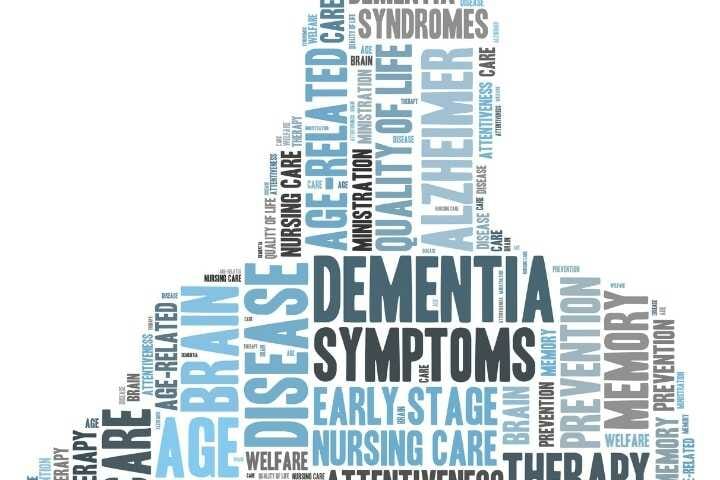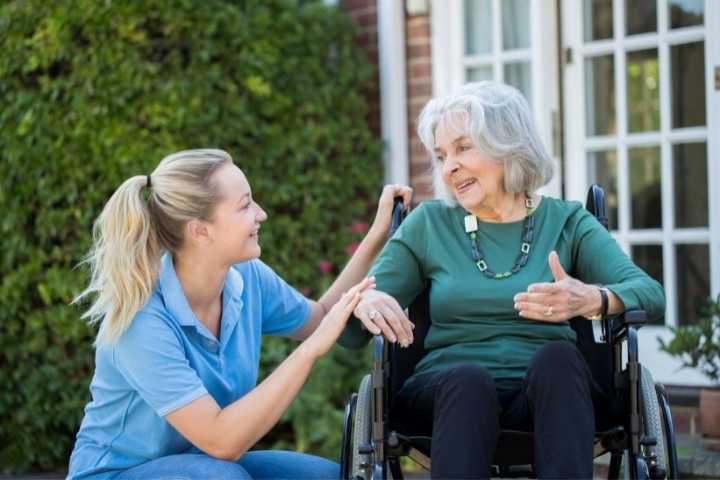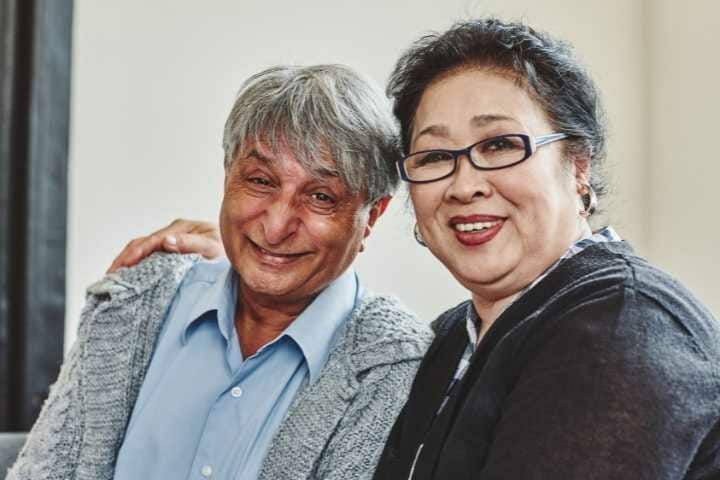Through this guide, we aim to provide every possible information to those seniors who are going through dementia and those who are taking care of these patients/
Contents
Dementia Information
Dementia is a term that refers to a series of symptoms that adversely affect memory, thinking, and social skills and interfere with daily activities. Dementia is not an isolated condition, but it can be caused by others.

Memory loss is often associated with dementia. However, memory loss can be caused by several factors. Often one of the first indicators, memory loss, is not always an indicator of dementia.
Alzheimer’s disease is the leading cause of progressive dementia in the elderly. However, dementia can be caused by several factors. Some symptoms of dementia can be undone, depending on the cause.
Dementia Symptoms
The symptoms of dementia depend on the cause. However, the following are some of the most common signs and symptoms.
- Changes in memory loss are usually detected by other people.
- Communication and word search is difficult.
- Visual and spatial problems, etc.
- Lost thoughts and problem-solving difficulties while driving
- Difficulty in completing difficult tasks
- Test planning and coordination and motor function problems
- Confusion and misunderstandings Changes in personality
- Anxiety and depression
- Inappropriate behavior Paranoia Induction of hallucinations.
Many people with dementia eventually stop or limit their diet and affect their diet. After all, you may not be able to chew or swallow-lung infection. Dysphagia increases the risk of choking, limits food intake, makes breathing difficult, and can cause pneumonia.
If you develop dementia, bathing, changing clothes, brushing your hair and teeth, using your own toilet, and taking your medication as directed can all be affected.
Routine activities such as driving, cooking, walking, and living alone can cause safety problems for people with dementia. Death. Late dementia can often cause unconsciousness and be fatal as a result of infection.
When Should You Visit the Doctor?
Damage or loss of nerve cells and their connections in the brain leads to dementia. Dementia affects people differently and causes different symptoms depending on which part of the brain is damaged.
Contact your doctor if you or your loved ones have memory problems or other symptoms of dementia. Finding the cause of your loved ones’ dementia symptoms is important because some of them are curable.

Dementia Causes And Types
Dementia is a gradual loss of cognitive, behavioral, and social abilities that makes it difficult for a person to operate independently.
Alzheimer’s disease
Alzheimer’s is a neurological disorder that causes the brain to shrink (atrophy) and brain cells to die. Alzheimer’s is the most frequent form of dementia.
Alzheimer’s affects around 5.8 million people in the United States aged 65 and over. Eighty percent of them are above 75 years old. Alzheimer’s disease is expected to affect 60 percent to 70 percent of the 50 million individuals globally who have dementia.
One of the earliest signs of Alzheimer’s disease is forgetting recent events or talks. As Alzheimer’s disease develops, a person’s memory will deteriorate, and their ability to do daily chores will deteriorate.
Parkinson’s Disease
Parkinson’s disease is a neurological disorder. Dementia follows Parkinson’s disease at least a year after diagnosis. Early signs of Parkinson’s disease include tremors and shakiness, muscular stiffness, a shuffling stride, stooped posture, trouble beginning movement, and a lack of facial expression.
These symptoms are caused by brain alterations in a region that plays a critical role in our movement. As the effects of Parkinson’s disease expand throughout the brain, they frequently begin to compromise mental processes.
The main brain abnormalities connected to Parkinson’s disease and Parkinson’s disease dementia are aberrant microscopic deposits made up mostly of alpha-synuclein, a protein distributed throughout the brain with an unknown normal function.
Vascular Dementia
Vascular dementia is a type of dementia that affects blood vessels. Damage to the blood arteries that carry blood to the brain causes this type of dementia. Abnormal blood vessels can affect the brain, including causing a stroke and damaging the white matter fibers of the brain.
Key Symptoms are:
- Poor problem-solving capabilities
- Poor thinking ability
- Loss of concentration
The aforementioned are the most common symptoms of vascular dementia. These are usually more noticeable than memory loss.
Dementia with Lewy bodies
Lewy bodies are aberrant balloonlike protein aggregates discovered in the brains of persons suffering from Lewy body dementia, Alzheimer’s disease, or Parkinson’s disease.
Common indicators and symptoms are
- Things that aren’t there (hallucinations),
- Lack of concentration and attention.
- Parkinson’s syndrome)
- Uncoordinated or sluggish behavior,
- Shivering and stiffness

Frontotemporal dementia:
Frontotemporal dementia is dementia that affects the frontal lobe. This is a category of diseases in which nerve cells in the frontal and temporal lobes of the brain and their connections are disrupted.
These are areas that are often associated with personality, behavior, and language. Behaviors, personalities, thoughts, judgments, languages , and movements are common signs.
Creutzfeldt-Jakob
Creutzfeldt-Jakob disease is a type of dementia. This rare brain disorder primarily affects people who do not have known risk factors. This disorder can be caused by the deposition of the infectious protein prion. Symptoms and signs of this fatal illness usually appear after age 60.
The etiology of Creutzfeldt-Jakob disease is usually unknown. However, it can be hereditary. B. Corneal transplants, such as exposure to the diseased brain and nervous system tissues, can induce this.
Other Diseases That Can Cause Dementia
- Huntington’s Disease Genetic variation can also cause Dementia, causing atrophy of certain nerve cells in the brain and spinal cord. Around the age of 30-40, signs and symptoms such as a significant loss of thinking (cognitive ability) appear.
- Traumatic brain injury (TBI) is a type of brain injury (TBI). Repeated head injuries are the leading cause of this syndrome.
- TBI usually occurs in boxers, soccer players, and soldiers. The disease can develop signs and symptoms of dementia, such as sadness, nervousness, memory loss, and difficulty speaking, depending on which part of the brain is damaged. Traumatic brain injury can cause Parkinson’s disease. After the experience, it may take several years for symptoms to appear.
- Infectious diseases and immune disorders. Symptoms like dementia can result from fever or other side effects in your body trying to fight the infection. Multiple sclerosis and other conditions caused by the body’s immune system that attack nerve cells can cause dementia.
Dementia Causes: Unavoidable Risk Factors
There are certain factors that put you at risk of dementia, and you might have no control over them.
Family history of Dementia:
You are more likely to acquire dementia if you have a family history of the disease. Many people with a family history never develop symptoms, whereas others with no family history do.
Down Syndrome:
Down syndrome is a condition in which a person is born. Many persons with Down syndrome acquire early-onset Alzheimer’s disease by middle age.

Dementia Causes: Avoidable Risk Factors
Diet And Dementia
The following dietary-related problems are also dementia risk factors and can be easily controlled with the proper dietary supplements.
Vitamin B12
The deficiency of vitamin B12 can cause symptoms such as dementia and other behavioral changes.
Vitamin B1
Thiamine (vitamin B1) deficiency is common in people with malnourished dehydration, persistent alcoholism, and dietary vitamin B6
Copper And Vitamin E
A deficiency of copper and vitamin E can also cause symptoms of dementia.
Alcohol consumption:
Individuals have been found to be at significant risk of developing dementia-overdose of alcoholic beverages. The effects of excessive alcohol intake on the brain have long been known.
According to several major studies and reviews, the problem of alcohol use is associated with an increased risk of dementia, especially early-stage dementia (a risk factor for cardiovascular disease).
Exercise and diet management
Regularly exercising is essential. Studies show that dementia is associated with a lack of exercise. There is no proven diet that reduces the risk of dementia. However, studies suggest that people who eat an unhealthy diet are at higher risk of dementia than those who eat a Mediterranean diet rich in fruits, vegetables, whole grains, nuts, and seeds.

Side effects of drugs
Dementia can also be caused by pharmacological side effects, drug reactions, or drug interactions (hematoma of the subdural space).
Symptoms of dementia can be caused by bleeding between the surface of the brain and the meninges, which is common in older people after a fall.
Tumors
Dementia is a rare complication of brain tumor damage and is a hydrocephalus of normal pressure. Swelling of the ventricles causes this disease, which can lead to difficulty walking, urinary tract problems, and memory loss.
People with BP
Excessive blood pressure (hypertension), high cholesterol, arterial wall fat deposition (atherosclerosis), and obesity
Depression:
Late depression can indicate the development of dementia, even if it is not well understood.
Diabetes.
Diabetes can increase the risk of dementia, especially if treated poorly.
Smoking.
Smoking is associated with an increased risk of dementia and vascular disease or air pollution.
Animal studies have shown that particulate matter in the atmosphere accelerates the deterioration of the nervous system. In addition, human studies have shown that air pollution, especially from traffic and wood stoves, is associated with an increased risk of dementia.
Head injuries
People with severe head injuries are more likely to develop Alzheimer’s disease. According to many extensive studies, people over the age of 50 suffering from traumatic brain injury (TBI) are more likely to develop dementia and Alzheimer’s disease. People with severe multiple TBIs are at higher risk.
Sleep Disorders:
Dementia is common in people with sleep apnea and other sleep disorders (lack of vitamins and nutrients). Having low amounts of vitamin D, vitamin B6, vitamin B12, and folic acid can increase the risk of dementia.
Limit the use of tranquilizers and sleeping pills, and consult your doctor to see if your prescription affects your memory.
Other Diseases
Endocrine and metabolic problems and Thyroid disease, as well as hypoglycemia, can put you at risk of dementia.
Preventing Dementia
Although there is no foolproof way to prevent dementia, things may be taken to aid. More research is needed. However, the following steps may be helpful:
Maintain mental activity.
Reading, puzzle-solving, word games, and memory training are examples of psychologically stimulating activities that might help postpone the onset of dementia and lessen its consequences. Recent evidence shows that learning new languages also helps prevent the onset of dementia.
Engage in physical and social activities.
Delay the onset of dementia and reduce its symptoms by engaging in physical exercise and social contact. Aim for 150 minutes of physical activity every week.

Stop smoking.
According to many studies, smoking has been linked to an increased risk of dementia and vascular disease in their forties and fifties. Quitting smoking lowers your risk and improves your health.
Make sure you’re getting adequate vitamins.
According to research, persons with low vitamin D levels in their blood are more prone to acquire Alzheimer’s disease and other dementias. Vitamin D may be obtained via a variety of foods, supplements, and sun exposure.
Before increasing vitamin D consumption to prevent dementia, further study is needed. However, it is prudent to ensure that you get adequate vitamin D. Vitamin B complex and vitamin C are also beneficial when taken daily.
Take care of your cardiovascular risk factors. High blood pressure, high cholesterol, and diabetes are all treated with this medication. Lose weight if you are overweight.
Certain kinds of dementia might be exacerbated by high blood pressure. Treatment for high blood pressure may lessen the incidence of dementia, but further study is needed.
Take care of your health.
Consult your physician about how to deal with sadness and anxiety. Maintain a balanced diet. A Mediterranean-style diet (high in fruits, vegetables, whole grains, and omega-three fatty acids found in certain fish and nuts) is beneficial to overall health and can lower your risk of dementia. This diet also aids in the improvement of cardiovascular health and the reduction of dementia risk.
Sleep Well
Maintain proper sleep hygiene and visit your doctor if you snore loudly or have time to hold or breathe out during sleep.
People with hearing loss are more likely to have cognitive deterioration. The risk can be reduced if deafness is treated early, as with hearing aids.
Wandering Among Dementia Patients
People with Alzheimer’s disease and other dementias often wander aimlessly and become lost. This behavior can occur in the early stages of dementia-even if the person has never been lost in the past.
Understanding wandering
People with dementia can wander if they return later than usual from a regular walk or drive or if they forget the way to a familiar place. There are many reasons why people with dementia wander:
- Stress and anxiety. People with dementia may walk around crowded areas such as restaurants in response to tension.
- They can get lost looking for something or someone, such as an old friend.
- Basic needs. They may be looking for a bathroom or food or want to go out.
- They may go to work or buy groceries and become confused about the route back.
The patients experience these problems because dementia affects regions of the brain that are critical for visual guiding and navigation. Hence a patient may get disoriented even in familiar surroundings.
How should caregivers tackle wandering?
Dementia wandering is one of the biggest problems associated with dementia patients because the patient is liable to get lost or hurt, people might take advantage of them, and in a bad neighborhood, it might even be a risk to the patient’s life.
There are many devices that assist caregivers in tackling wandering, such as special dementia locks that patients find difficult to open, devices that alarm the caregiver when a patient wanders outside a certain radius around the house, sleep monitoring alarms that will alert you if the dementia patient has woken up and is wandering in the house at night.
Here are some more ways you can help a Dementia patient who wanders
- Assist with oversight. It’s ideal for constant monitoring. Ascertain that someone is constantly at home with that individual. When you’re in a new or different setting, be with that individual.
- Please do not leave the keys in the car alone; install Alarms and locks. Various technologies can alert dementia patients while they are outside.
- A pressure-sensitive alarm mat may be placed on a person’s door or bed, a warning bell can be attached to the door, a child-friendly cover can be used on the doorknob, or an alarm system that sounds when the door opens can be installed.
- Install a sliding lockout of sight if someone has a habit of unlocking the door. Camouflage the door, On the door, hang a detachable curtain. Paint or wallpaper the door to fit the color scheme of the room. Alternatively, hang a scenic poster or a sign that reads “Stop” or “Don’t enter” on the entrance.
- Make the keys undetectable. Hide the automobile key when a dementia patient stops driving. Also, store shoes, jackets, hats, and other objects that may be used to obscure your home in a safe place.
- Wanderers may forget their names or where they live once they’ve been located. Please notify the local police, neighbors, and other close contacts if caring for a wanderer.
- Make a list of emergency phone contacts in case you can’t locate a dementia patient. Have a recent photo or video of that person and their medical documents and a list of potential destinations. B. Previous residence or place of employment.
- Place labels in the person’s clothing and carry an identity card or wear a medical bracelet.
- Enroll in the MedicAlert and Alzheimer’s Association safe-return programs, as well. Participants pay a charge to acquire an identity bracelet, necklace, or clothing tags, as well as access to 24-hour emergency help.
- You might also have your loved one wear a GPS tracker or another type of tracking gadget.
- If the person with dementia wanders, check the immediate area for no more than 15 minutes before contacting local authorities and enrolling in a safe-return program. The sooner you request assistance, and the more likely the individual will be discovered.

Link Between UTIS And Dementia
Urinary tract infections (UTIs) are common infections in the elderly. They are usually caused by bacteria that enter the urinary tract through the urethra. The bacteria then travel backward through the urinary tract, infecting the bladder and, if not detected, the kidneys.
Women are more likely to have a urinary tract infection than men, and almost 50% of women need to be treated for at least one urinary tract infection in their lifetime.
Studies have shown that UTIS and Dementia are positively correlated to each other.
Symptoms of urinary tract infections in the elderly with dementia
- People with dementia may experience the usual physical pain symptoms resulting from a urinary tract infection.
- These include a burning sensation when urinating.
- Need to urinate violently and frequently Cloudy, dark, or hematuria Malaise Shivering Fever or chills.
Connect With Loved Ones With Dementia
Connecting with a dementia patient is not easy. Dementia tends to rob you of your memories, and as the disease progresses, you might even lose speech and vision.
However, love is more powerful than any disease, and as long as you treat the patient with care, respect, and love, you will always get a response. Here are a few things you should remember when trying to connect with a dementia patient:
Understand which reality they are living in
Your parents might be reliving their 30s or 40s. Dementia tends to take you to a world that you have long passed, but if you listen carefully, you will pick up the hints of the era in which your parents are reliving. Rather than trying to correct them, join in.
Don’t argue.
It’s difficult not to argue when a person makes no sense. But you have to remember to always be calm and agreeable. Even if they don’t know who you are, try to act normal and reassuring.
Music unites.
Music has a way of being in your memory well beyond other things like voices and fragrances. Try to engage the patient in music.
Reminisce
Even if your loved one can no longer talk, just reminiscing about the old days can help them feel good.
Touch therapy.
Touching a person releases hormones that bring you closer. Try to touch their face, rub their shoulders, and hold their hands as often as possible.
Start The Conversation About Dementia
Starting a conversation with a dementia patient can be very difficult. Here are some techniques that you should use when talking to them
- Make eye contact
- Never assume that they know you. Always introduce who you are.
- Start with an activity suggestion (Let’s go through your old music records)
- Talk politely, lovingly, and clearly.
- Don’t offer complex ideas. Take things one at a time.
- Keep the questions short and to the point.
- Use nonverbal communication to accentuate what you are speaking.

Activities to do with dementia patients
Here is a list of things that you can enjoy with your elderly loved ones who are undergoing dementia.
Crossword puzzles
Crosswords and other puzzles are good for the onset and middle stages of dementia. They help keep the brain engaged.
Jigsaw puzzles
Online and offline jigsaw puzzles can help stimulate the mind of dementia patients in the early stage of the disease. In fact, some puzzles are created especially for such patients.
Computer games are a nice option.
For those with dementia who can use a laptop or tablet, there are an increasing variety of dementia-friendly computer activities available, such as puzzles, Sudoku, coloring, and other games and activities.
Bingo
Bingo helps stimulate the mind, and you can easily adapt it for a patient with dementia as well.
Card games
Simple card games can be adapted to play with early-stage dementia patients who can still understand numbers and letters easily.
Jokes
A few jokes can always lighten the mood if your patient is moving into a lonely and depressive state.
Chair Exercises
There are many forms of exercises that you can do sitting on a chair, such as moving your torso and swinging your arms.
Swimming
Aquatic sports may be a good alternative for persons who used to like swimming before developing dementia.
Dance
Dance steps in simple combinations can be a delightful way to spend an afternoon with your loved one who is suffering from dementia.

Tai Chi.
Tai Chi is a form of peaceful martial art that originated in China. The exercises are great for mindfulness.
Painting or drawing
Letting their creative juices can be a really elevating experience for a dementia patient.
Make a box to store your memories in
Don’t be frightened to reminisce on the past. Patients with dementia have activities that they have cherished throughout their life. Putting together artifacts from those memories is an excellent experience.
Gardening and flower arrangement
Gardening and putting up a small flower show can be another beautiful way to spend time with a dementia patient.
Music
Music has a way of staying with a person through the most difficult of circumstances. Try to play the music that the patient enjoyed before they got dementia, and you are sure to get a response.
Reading
Poetry, stories, and even the news are excellent ways of getting a dementia patient more active.
Baking
Baking and cooking are excellent activities for engaging the mind.
Walking in the woods
Taking a walk is healthy and great for the mind.
Playing with a pet is a lot of fun.
Dogs and cats offer unconditional love. Letting the patient spend an evening with them might be a great way to keep them engaged.
Set up a bird feeder or a fish tank
Birds and fish help calm the mind of a dementia patient.
Understanding Medicaid For Dementia
The financial qualifying standards for Medicaid vary by state. However, there are some minimum federal requirements:
- People who receive Supplemental Security Income (SSI) benefits are immediately eligible for Medicaid in most states.
- Beneficiaries must have low incomes (about 74 percent of poverty, or $8,796 per year for a person) and little assets and be unable to work to be eligible for SSI.
- States can additionally offer Medicaid coverage to the elderly and individuals with disabilities who earn up to 100 percent of the federal poverty line ($12,880 for an individual in 2021).
- States may also choose to provide Medicaid coverage to persons who have spent down their surplus income or assets to reach the financial eligibility requirement.
Over a year, around a quarter (24%) of community-dwelling seniors with dementia had Medicaid coverage. As long as they have a low income and little assets, nearly all persons with dementia (95 percent) obtain Medicare benefits, and some may also qualify for Medicaid through an age (65+) or disability-related pathway.

Wrap Up
We hope that our guide has given you enough information, things to think about new learning to take back home to your elderly loved ones who have dementia. If we have been able to make a single change for the better in dementia patients’ life today, we would feel that our hard work in putting together this exhaustive guide has been worthwhile.
Do share with us what learnings you have taken from our guide and how you are implementing them in the lives of those that depend on you. If you have more questions, comments, and doubts, our comment sections are always open to receiving your wisdom.
And as always, if you loved the content, please share it with someone else who might need it. Your kind words of appreciation are always treasured by us.
